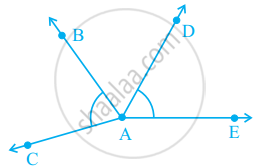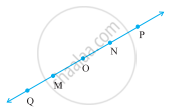Advertisements
Advertisements
प्रश्न
In figure, points A, B, C, D and E are collinear such that AB = BC = CD = DE. Then 
AE = ______ × AB.
उत्तर
In figure, points A, B, C, D and E are collinear such that AB = BC = CD = DE. Then 
AE = 4 × AB.
Explanation:
∵ AB + BC + CD + DE = AE
⇒ AB + AB + AB + AB = AE
∴ 4 AB = AE
APPEARS IN
संबंधित प्रश्न
Number of lines passing through five points such that no three of them are collinear is ______.
In figure, points A, B, C, D and E are collinear such that AB = BC = CD = DE. Then 
AD = AC + ______
The number of common points in the two angles marked in figure is ______.
In given figure, is AC + CB = AB ?
In given figure, is AB + BC = CA?
In the given figure, how many points are marked? Name them.
In given figure, how many points are marked? Name them.
Draw a rough figure and label it suitably in the following case:
Point P lies on `overline"AB"`.
Consider the following figure of line \[\overleftrightarrow{MN}\]. Say whether the following statement is true or false in the context of the given figure.

O is not an initial point of `vec("OP")`.
Consider the following figure of line \[\overleftrightarrow{MN}\]. Say whether the following statement is true or false in the context of the given figure.

N is the initial point of `vec("NP")` and `vec("NM")`.
